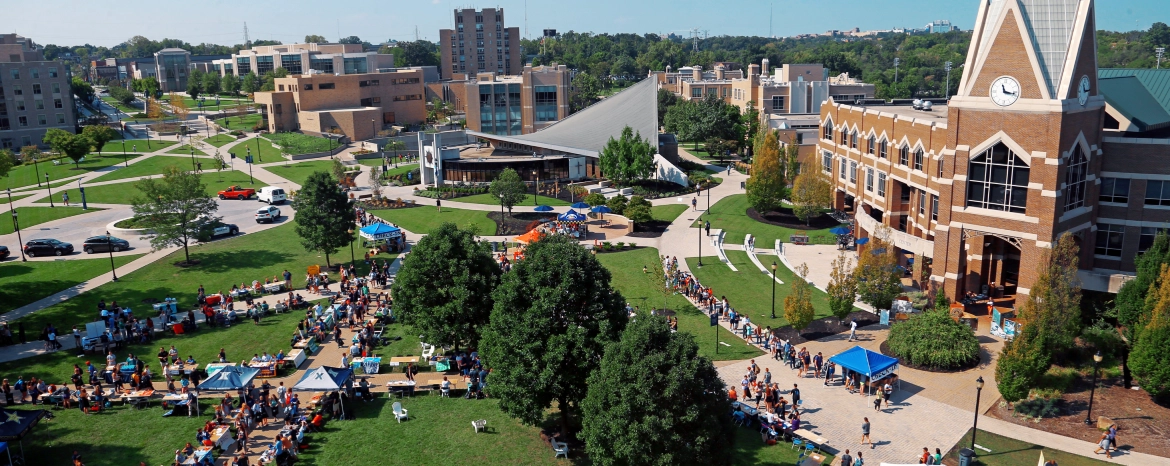Economics, Sustainability and Society
Bachelor of Arts

Fall
- ECON 200: Microeconomics (Soc. Science Elec.) ............ 3cr.
- Core 100: First-Year Seminar: environmental topic preferred ............ 3cr.
- Historical Perspective: environmental topic preferred ............ 3cr.
- English 101 or 115: English Composition or Rhetoric ............ 3cr.
- second language I ............ 3cr.
- Core 101: Freshman Experience ............ 0cr.
Spring
- ECON 201: Macroeconomics (recommended for ECOS) ............ 3cr.
- THEO 111: Ignatian Imagination ............ 3cr.
- Scientific Perspectives: BIOL 120 Life: Ecology and People (2), w/Lab (1)--or other BIOL w/Lab preferred ............ 3cr.
- MATH 140 or 150: Elements of Calculus or MATH 170 (Mathematical Perspectives) ............ 3cr.
- second language II ............ 3cr.
- Core 102: Freshman Experience ............ 0cr.
Fall
- ECON 320: Environmental, Natural Resource & Ecological Economics ............ 3cr.
- SUST 301: Cultural Studies & Sustainability ............ 3cr.
- BIOL 250 Ecology (3) & 251 Lab (1) (preferred Natural Science Elective) ............ 4cr.
- STAT 210: Statistics for Business I ............ 3cr.
- PHIL 100: Ethics as Intro to Philosophy ............ 3cr.
Spring
- ECOS Elective I -- select from approved courses* ............ 3cr.
- MGMT 322: Managing for Sustainability ............ 3cr.
- STAT 211: Statistics for Business II** ............ 3cr.
- PHIL 200 (Philosophical Perspectives) ............ 3cr.
- General Elective - Practicum or Internship preferred ............ 3cr.
Fall
- ECON 341: Economics of Developing Countries ............ 3cr.
- ECON 305: Microeconomics Analysis ............ 3cr.
- ECON Elective II -- Select from approved courses* ............ 3cr.
- General Elective or Minor ............ 3cr.
- Humanities Elective: environmental or justice topic preferred ............ 3cr.
Spring
- ECON 421: Environment, Economics & Policy ............ 3cr.
- SUST 401: Sustainable Econ Development ............ 3cr.
- English 205: Literature & Moral Imagination: environmental or justice topic preferred ............ 3cr.
- General Elective or Minor ............ 3cr.
- General Elective: Practicum or Internship Preferred ............ 3cr.
Fall
- SUST 495 Capstone Elective: Experiential Integrative Project ............ 2cr.
- ECOS Elective III - select from approved courses* ............ 3cr.
- Theological Perspectives: environmental or justice topic preferred ............ 3cr.
- Creative Elective ............ 3cr.
- General Electives or Minor ............ 3cr.
Spring
- SUST 495 Capstone: Experiential Integrative Project ............ 1cr.
- Environmental Policy Seminar -- 345/POSC 344 or other approved course ............ 3cr.
- General Elective - Practicum or Internship preferred ............ 3cr.
- General Elective or Minor ............ 3cr.
The sample course sequence above illustrates class offerings for the Economics, Sustainability and Society major. Consult the official Xavier University course catalog for detailed registration and advising information.
Exciting Career Opportunities
Sustainability Analyst, Agricultural Researcher, Urban Forestry Survey Technician, Education Specialist, Laboratory Technician
Recent Employers of Graduates
Connected Cities Integrators, Inc., Great Parks of Hamilton County, Davey Resource Group, Cornell AgriTech, U.S. Army, Monroe County Environmental Health Department, Urban Servant Corps, Crossroad Health Center, Indianapolis Zoo, Visionworks of America, Boy Scouts of America
Cultural Studies & Sustainability (SUST 301)
Drawing on sociology, literary criticism, history and postcolonialism studies, students will examine the relation between sustainability and theories of culture as a site of resistance and negotiation where different groups compete for recognition, representation and power. Students will consider sustainability as a cultural construction and compare different cultural processes and practices surrounding the notion of sustainability.
Managing For Sustainability (MGMT 322)
This course provides an overview of the issues faced by business managers related to the topic of Triple Bottom Line Sustainability: economic vitality, environmental stewardship and corporate social responsibility. The course emphasizes experiential learning and practical application of concepts.
Environment, Economics & Policy (ECON 421)
This course examines concepts and models concerning economics and the environment, with applications to policy questions. Project work will focus on particular natural resources or ecosystem services.
Natural Resource Economics (ECON 320)
Economic analysis of managing the environment and allocating natural resources. Historical roots and ethical consequences of existing problems and policies are explored.
Xavier Student Sustainability
Students in this club actively promote environmental initiatives on Xavier's campus and in the surrounding communities. Projects include campus composting, recycling and Sustainability Day.
Economics Association
Xavier students in the Economics Student Club learn about employment opportunities, take trips to area firms and host speakers while making a positive difference in the community. They also cultivate opportunities to meet and network with business leaders in Cincinnati, which can lead to employment opportunities.
Business Leaders for Tomorrow
Members of this student organization explore business processes firsthand by networking with and learning from various business leaders in Cincinnati and beyond. Events from past years have included trips to Silicon Valley and Chicago, job shadowing days and guest lecturers.

There’s nothing like experiencing campus for yourself. Schedule a visit and earn a $1,000 grant.*
Program Features
Gain the skills to solve real-world economic challenges through research experiences, whether that's by examining income inequality, assessing government policies or predicting market trends.
An ECOS degree is a commitment to the common good. By fusing high-level financial strategy with a focus on ecological and social justice, our curriculum prepares you to build systems that serve the many, not the few.
Learn from professors with extensive industry experience and a passion for teaching. Thanks to our 11:1 student-to-faculty ratio, they provide personalized attention, mentorship, and guidance throughout your academic journey.
We don’t just teach environmental stewardship; we practice it through aggressive carbon reduction and zero-waste initiatives that prove a greener world is possible.
Hear firsthand why students love Xavier, life in Cincinnati and their chosen academic majors.
Nearly 200 students participate in Alternative Breaks each year. Some students visit the coast of California to help conserve an important ecosystem, others refurbish homes for refugees in Boise, Idaho.
FAQ
Gain a deep understanding of the economics, sustainability and society major. Our courses prepare students for a dynamic career filled with challenges and rewards. Explore some of the most common questions.Sustainability Consulting
- Role: Advising businesses and organizations on sustainable practices and strategies.
- Skills: Economic analysis, environmental impact assessment, policy development.
Government and Public Policy
- Role: Developing and implementing policies related to sustainability, climate change, and social justice.
- Skills: Policy analysis, public administration, stakeholder engagement.
Corporate Social Responsibility (CSR)
- Role: Overseeing a company's social and environmental impact.
- Skills: Sustainability reporting, stakeholder engagement, ethical business practices.
A degree in economics, sustainability, and society equips students with a diverse range of skills that are highly valuable in today's job market. Here are some key skills that majors typically gain:
- Economic modeling: Ability to create and interpret economic models to understand complex relationships between variables.
- Economic theory: Knowledge of core economic principles, such as supply and demand, market equilibrium, and macroeconomic concepts.
- Environmental awareness: Understanding of environmental issues, including climate change, resource depletion, and pollution.
- Sustainable development: Knowledge of principles and practices for promoting economic growth while protecting the environment and social well-being.
- Social analysis: Ability to understand social dynamics, inequality, and equity issues.
- Stakeholder engagement: Skill in interacting with diverse groups and building consensus.
- Ethical decision-making: Ability to consider ethical implications and make responsible choices.
Located in Cincinnati, Ohio
Cincinnati, Ohio is a city made for exploration. With parks, bike trails, and scenic riverbanks, there's more than just your dorm room to call home.
Economics, Sustainability and Society Program at Xavier University
The Economics, Sustainability, and Society program focuses on balancing the demands of the present without compromising future needs all within the context of our increasingly complex, inter-related global economy. Students acquire a comprehensive understanding of sustainable economies, including the study of natural resources, plus ecological and environmental problems. Students also gain an understanding of social justice questions related to the distribution of economic products and resources. The ECOS program includes field trips, practicums and internships all culminating in an integrative capstone with hands-on projects.
Xavier University’s College of Arts and Sciences challenges students to develop an integrated understanding of humanity, the world, and God by pursuing the questions raised in Xavier's core and departmental curricula. The College of Arts and Sciences is the oldest and largest college at Xavier University. The college provides an excellent liberal arts education in the Jesuit tradition that prepares students for careers, professional or graduate school, and life in a global society.
Xavier University is a private university located in Cincinnati, Ohio, providing a liberal arts education in the Jesuit Catholic tradition. Founded in 1831, the University is the sixth-oldest Catholic university in the nation. It has been ranked among the top 10 master's-level universities in the Midwest by U.S. News & World Report for the past two decades. The Princeton Review names it one of the "Best 385 Colleges in America."